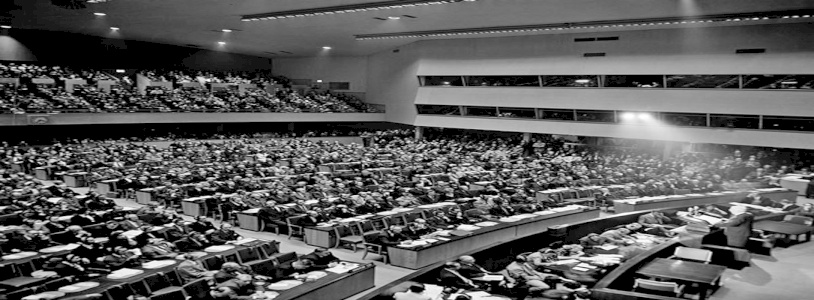Press Releases

30/9/2025
With the United Nations Security Council paralyzed by repeated US vetoes, the General Assembly must activate the Uniting for Peace resolution to end the ongoing genocide in Gaza. Resolution 377 (V) of 1950, entitled “Uniting for Peace,” empowers the General Assembly to invoke an emergency special session and advance collective measures when the Security Council fails due to permanent members’ vetoes. Drawing on the model of Namibia, the General Assembly can adopt concrete actions, including imposing sanctions, enforcing an arms embargo, isolating the Israeli regime and ensuring humanitarian efforts led by UNRWA to end the genocide.
In the context of Gaza, the repeated convening of the Tenth Emergency Special Session on Palestine emphasises the General Assembly’s potential to respond where the Security Council remains blocked by US vetoes. At the same time, many member states, most particularly the US itself, are complicit in enabling and sustaining the Israeli’s regime’s genocide and numerous international crimes. This makes it all the more urgent for states to act through the General Assembly by activating the Uniting for Peace mechanism to impose the full range of economic, military and political sanctions and uphold their obligations under international law.
The Namibia precedent demonstrates the potential of Uniting for Peace. In 1981, the General Assembly convened an emergency special session on South Africa’s illegal occupation of Namibia. Initially, resolutions focused on condemnation, reaffirmation of rights, and calls on states to provide material, financial and military assistance to the liberation movement. Later resolutions went beyond condemnation, implementing comprehensive sanctions, diplomatic isolation and economic boycotts on the South African regime. Crucially, there were set deadlines for member states to report back on measures taken, creating a continuous loop of accountability. A dedicated monitoring body, the United Nations Council for Namibia, was established to track implementation, keep the issue on the agenda and ensure sustained international pressure. This special council collected states’ reports, monitored compliance and submitted regular reports to the General Assembly on which member states adhered to the measures for Namibia and which did not. This mechanism was instrumental in dismantling apartheid and securing Namibia’s freedom.
Another important element in the Namibia case lies in the strength and specificity of the operative language, leaving no question concerning states’ obligations and required measures. Direct, precise actions were mandated: provide financial, material and military support to the South West Africa People’s Organization (SWAPO) after recognizing it as the sole and authentic representative of the Namibian people; cooperate fully with the UN Council for Namibia; and impose comprehensive sanctions on the South African regime. In contrast, Palestine resolutions tend to rely on vague language and obscure actions such as calling on states to take all measures necessary to ensure the Israeli regime abides by international law, or reaffirming the responsibility of the UN to address “the question of Palestine.” These formulations do not clearly mandate specific actions, nor create enforceable obligations, or establish accountability mechanisms, limiting the Assembly’s ability to ensure effective compliance.
The situation in Palestine today requires a similar approach to that in Namibia. The Tenth Emergency Special Session, first convened in 1997 and repeatedly resumed, has yet to change conditions on the ground for Palestinians. The most recent US veto - the 6th since the Israeli genocide began - highlights the ongoing obstruction of the Security Council resolutions, leaving the Council and its accountability mechanisms paralysed in the face of genocide in Gaza, the use of starvation as a weapon of war and ongoing Israeli apartheid and colonization.
In his UN address on 23 September 2025, Colombian President Gustavo Petro, called on states to invoke Resolution 377: “The UN must above all stop the genocide in Gaza.” The Colombian President named the Israeli regime, the United States and European allies as complicit actors, and urged accountability. With the genocide in Gaza continuing for nearly two years, his call stresses the critical need for immediate actions by states. Member states must convene the Tenth Emergency Special Session and adopt effective measures demonstrated in the Namibia case, including:
- Sanctions comprised of a mandatory two-way arms embargo; and comprehensive diplomatic, economic, academic, cultural and athletic sanctions;
- An accountability mechanism, such as the UN Council for Namibia, to monitor and track states’ adherence;
- The establishment of an independent special commission to collect and document evidence of genocide, alongside a special tribunal for Gaza to ensure accountability and legal proceedings;
- The establishment of a UN committee for reparations, which centers reconstruction in the Gaza Strip with a rights-based reparative approach;
- Banning the activities of Israeli and Zionist institutions, organizations and companies within states’ jurisdictions, in response to the banning of UNRWA;
- Dismantling the Gaza Humanitarian Foundation (GHF), and restoring the UN-led system by renewing UNRWA’s mandate and fully funding its operations, protecting its staff and maintaining its core programs.
States are obligated to act individually and collectively to end genocide. The choice before the General Assembly is clear: either preserve the credibility of the UN system by acting decisively where the Security Council has failed, or remain complicit in the ongoing genocide on Gaza. Uniting for Peace provides the legal and political framework for member states to uphold their obligations and confront genocide as a collective, but does not diminish each state’s obligation to impose sanctions individually.
